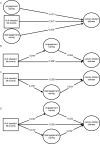Evaluation of coping as a mediator of the relationship between stressful life events and cancer-related distress
- PMID: 28825498
- PMCID: PMC5712475
- DOI: 10.1037/hea0000524
Evaluation of coping as a mediator of the relationship between stressful life events and cancer-related distress
Abstract
Objective: Lifetime stressful life events (SLEs) may predispose oncology patients to cancer-related distress (i.e., intrusive thoughts, hyperarousal, avoidance). Coping may influence cancer-related distress by mediating this relationship. This study sought to (a) determine the prevalence and impact of lifetime SLEs among oncology outpatients receiving chemotherapy and (b) examine the relationship between SLEs and cancer-related distress and the mediating role of coping on this relationship.
Method: Patients (n = 957), with breast, gastrointestinal, gynecologic or lung cancer, who were undergoing chemotherapy, completed the Life Stressor Checklist-Revised (LSC-R), a measure of lifetime SLEs. Cancer-related distress was assessed with the Impact of Event Scale-Revised. Coping strategies since beginning chemotherapy were assessed with the Brief COPE; 2 latent variables (engagement and disengagement coping) were identified based on these scores. LSC-R scores (number of SLEs and perceived impact during the prior year) were evaluated in relation to demographic and clinical characteristics. Structural equation modeling was used to evaluate the relationship between LSC-R and Impact of Event Scale-Revised scores and the mediating role of engagement and disengagement coping on this relationship.
Results: On average, patients reported 6.1 (SD = 4.0; range = 0-23 out of 30) SLEs. Patients who were not married/partnered, had incomes <$30,000/year, or who had lower functional status or greater comorbidity had higher LSC-R scores. The relationship between more SLEs and more severe cancer-related distress was completely mediated by disengagement coping. Engagement coping did not mediate this relationship.
Conclusions: Disengagement coping, including behavioral disengagement, avoidance, and denial, should be targeted to mitigate cancer-related distress. (PsycINFO Database Record
(c) 2017 APA, all rights reserved).
Figures

References
-
- Acock AC. Discovering Structural Equation Modeling Using Stata (Revised Ed.) College Station, TX: Stata Press; 2013.
-
- Andersen BL. Predicting sexual and psychologic morbidity and improving the quality of life for women with gynecologic cancer. Cancer. 1993;71(4 Suppl):1678–1690. - PubMed
Publication types
MeSH terms
Grants and funding
LinkOut - more resources
Full Text Sources
Other Literature Sources
Medical

